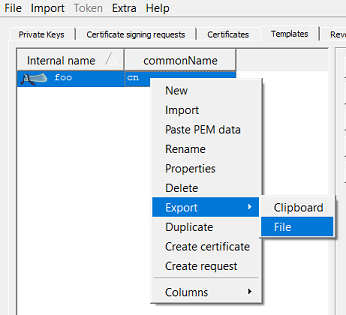xca_template_helper.py can be used to decode certificate templates used by XCA which is a great tool for managing certificates for home- and small enterprise networks.
XCA templates are stored in a proprietary format. I tried to reverse-engineer the format as my request for documentation has unfortunately not been answered.
Special thanks to @mpeylo for the initial analysis.
Before running the tool you need to export the template into a file.
After export you can run the parse to get the details.
grindsa@ub18-04:~$ py ./xca_template_parser.py example/example.xcaThe script will print two dictionaries on std-out:
- a list of dn attributes taken from the template
- a list of certificate attributes and extensions
# DN attributes
{'commonName': 'cn',
'countryName': 'co',
'localityName': 'locality',
'organizationName': 'organization',
'organizationalUnitName': 'ou',
'stateOrProvinceName': 'state'}
# certificate extensions and attributes
{'adv_ext': None,
'authInfAcc': None,
'authKey': '1',
'basicPath': None,
'bcCritical': '1',
'ca': '2',
'crlDist': 'URI:https://foo.bar',
'eKeyUse': 'serverAuth, clientAuth, ipsecEndSystem, ipsecTunnel, ipsecUser',
'ekuCritical': '1',
'issAltName': None,
'keyUse': '3',
'kuCritical': '1',
'noWellDefinedExpDate': '0',
'nsBaseUrl': None,
'nsCARevocationUrl': None,
'nsCaPolicyUrl': None,
'nsCertType': '5',
'nsComment': 'xca certificate',
'nsRenewalUrl': None,
'nsRevocationUrl': None,
'nsSslServerName': None,
'subAltName': None,
'subKey': '1',
'validM': '1',
'validMidn': '0',
'validN': '1'}Please read CONTRIBUTING.md for details on my code of conduct, and the process for submitting pull requests. Please note that I have a life besides programming. Thus, expect a delay in answering.
I use SemVer for versioning. For the versions available, see the tags on this repository.
This project is licensed under the GPLv3 - see the LICENSE file for details
